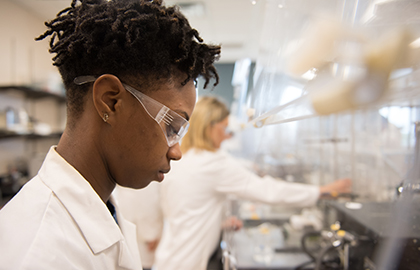
Create Solutions to Help Shape the Future of a Growing Industry
Nuclear Science is a prominent and expanding field, especially in the state and region. The proximity of the Savannah River Site, expanding missions and research opportunities at the Savannah River National Laboratory, the expansion of the Plant Vogtle facility, and the importance of radionuclides in medical physics each represent some of the various rewarding career opportunities for graduates with nuclear science experience.
Nuclear science 4-year degree programs are not common, and graduates will have knowledge and skills to set them apart from others. Nuclear workers have a high-value skill set in an expanding field.
Nuclear Science Program
Health Sciences Campus
Science & Mathematics Building
706-729-2509
Careers
Students that graduate with a nuclear science degree can find themselves in some of the following career opportunities:
Where do they go after graduation?
circle icon Employed in Degree Related Area
circle icon Graduate/Professional School
circle icon Military via ROTC
circle icon Other circle icon Unknown
Interests
Successful chemistry and physics majors develop strong problem-solving skills and are interested in learning how the world around them works. Many chemistry and physics majors find great satisfaction with the laboratory work including manipulation of materials and operating analytical instruments. In the nuclear science laboratory, students will gain hands-on experience with a variety of radiation detectors and electronics supporting them.
Start a Reaction
The nuclear track is open to both Chemistry and Physics majors. The track consists of 3 nuclear courses as a part of a comprehensive curriculum, with the course title being CHEM or PHYS depending on the major. CHEM3000 or PHYS3000: “Introduction to Nuclear Science”; CHEM 3010 or PHYS3010: “Introduction to Nuclear Measurements”; CHEM 3020 or PHYS3020: “Applications of Nuclear Science”.
A new nuclear science lab has been created which will allow students to gain access and experience with radiation detection and measurements which are applicable to both research and industry endeavors.
Average number of scholarships awarded per semester
Average scholarship awarded per semester
Student internships at SRS with SRNL or SRNS
Hands On Experience
Our goal of incorporating nuclear education into the chemistry and physics degrees that we offer is extremely important to the future needs of our local and national workforces.
Augusta University is one of the few institutions that offers chemistry and physics majors the opportunity to participate in a Nuclear Science track.

Undergraduate Research
The Center for Undergraduate Research and Scholarship (CURS) supports faculty-led research and scholarly activity with undergraduates at Augusta University in a variety of ways including:

Assistantships
The department offers many students the opportunity to work as paid assistants in our introductory lab courses. These students work alongside our faculty helping students and preparing labs. In addition, many of our students work as tutors in the department's Student Tutor Center.
Supported by the US Department of Energy
Scholarships of up to $5,000 per semester are available to assist students in completing a Bachelor of Science degree with a demonstrated interest in a career in the nuclear workforce. Students will be accepted on an individual semester basis requiring a resubmission of a renewal application for subsequent semesters. Part-time students may qualify for partial scholarships.
-PHYS 2211 for physics
-CHEM 1212 for chemistry
-Appropriate gateway course for other majors
The College of Science and Mathematics provides students with strong foundations in the sciences as well as preparation for careers, citizenship, and a life-long love of learning. We are committed to providing experiences promoting scientific inquiry and discovery and dedicated to creating opportunities for intellectual growth and community involvement.
